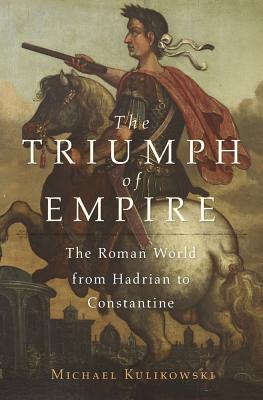

 Harvard University Press
Harvard University Press
The Triumph of Empire: The Roman World from Hadrian to Constantine


Key Metrics
- Michael Kulikowski
- Harvard University Press
- Hardcover
- 9780674659612
- 9.3 X 6.1 X 1.3 inches
- 1.75 pounds
- History > Ancient - Rome
- English
 Secure Transaction
Secure TransactionBook Description
The Triumph of Empire takes readers into the political heart of imperial Rome and recounts the extraordinary challenges overcome by a flourishing empire. Michael Kulikowski's history begins with the reign of Hadrian, who visited the farthest reaches of his domain and created stable frontiers, and spans to the decades after Constantine the Great, who overhauled the government, introduced a new state religion, and founded a second Rome.
Factionalism and intrigue sapped the empire from within, even at its apex. Roman politics could resemble a blood sport: rivals resorted to assassination; emperors rose and fell with bewildering speed, their reigns measured in weeks, not years; and imperial succession was never entirely assured. Canny emperors--including Marcus Aurelius, Septimius Severus, and Diocletian--constantly cultivated the aristocracy's favor to maintain a grip on power. Despite such volatility, the Roman Empire protected its borders, defeating successive attacks from Goths and Germans, Persians and Parthians. Yet external threats persisted and the imperial government sagged under its own administrative weight. Religion, too, was in flux with the rise of Christianity and other forms of monotheism. In the fourth century CE, Constantine and his heirs reformed imperial institutions by separating civilian and military hierarchies, restructuring the government of both provinces and cities, and ensuring the prominence of Christianity.
The Triumph of Empire is a fresh, authoritative narrative of Rome at its height and of its evolution--from being the central power of the Mediterranean world to becoming one of several great Eurasian civilizations.
Author Bio
I am a late Roman historian and work on the political and institutional history of the empire between the second and fifth centuries, with a special interest in how one can read historical sources against the background of other evidence.
My first book was a study of Roman and post-Roman Spain that tried to set the small body of written texts against the background of material culture; my second looked at the impact of Roman imperialism on neighboring territories and argued that the history of the barbarians, specifically the Goths, can be understood entirely as a response to Roman imperialism.
I am presently at work on four projects: a history of the Roman empire from Hadrian to the fall of the western empire for the Profile History of the Ancient World; a study of late imperial political culture and the gap between political rhetoric and political practice called The Rhetoric of Being Roman; a history of the Latin chronicle tradition from its beginnings to the fifth century AD, in four volumes and in collaboration with R.W. Burgess; and as editor-in-chief of the forthcoming Landmark Ammianus Marcellinus.
Before coming to Penn State in 2009, I taught for eight years at the University of Tennessee.
Education
- PhD, University of Toronto, 1998
MA, University of Toronto, 1992
BA, Rutgers University, 1991
Source: PennState College of Liberal Arts
Videos
No Videos
Community reviews
Write a ReviewNo Community reviews